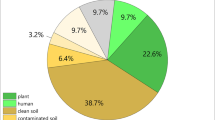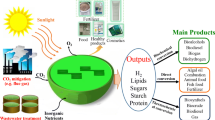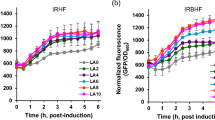Abstract
The lack of industrially suitable microorganisms for converting biomass into fuel ethanol has traditionally been cited as a major technical roadblock to developing a bioethanol industry. In the last two decades, numerous microorganisms have been engineered to selectively produce ethanol. Lignocellulosic biomass contains complex carbohydrates that necessitate utilizing microorganisms capable of fermenting sugars not fermentable by brewers' yeast. The most significant of these is xylose. The greatest successes have been in the engineering of Gram-negative bacteria: Escherichia coli, Klebsiella oxytoca, and Zymomonas mobilis. E. coli and K. oxytoca are naturally able to use a wide spectrum of sugars, and work has concentrated on engineering these strains to selectively produce ethanol. Z. mobilis produces ethanol at high yields, but ferments only glucose and fructose. Work on this organism has concentrated on introducing pathways for the fermentation of arabinose and xylose. The history of constructing these strains and current progress in refining them are detailed in this review.


Similar content being viewed by others
References
Alterthum F, Ingram LO (1989) Efficient ethanol-production from glucose, lactose, and xylose by recombinant Escherichia coli. Appl Environ Microbiol 55:1943–1948
Asghari A, Bothast RJ, Doran JB, Ingram LO (1996) Ethanol production from hemicellulose hydrolysates of agricultural residues using genetically engineered Escherichia coli strain KO11. J Ind Microbiol 16:42–47
Barbosa MDS, Beck MJ, Fein JE, Potts D, Ingram LO (1992) Efficient fermentation of Pinus sp. acid hydrolysates by an ethanologenic strain of Escherichia coli. Appl Environ Microbiol 58:1382–1384
Beall DS, Ohta K, Ingram LO (1991) Parametric studies of ethanol-production from xylose and other sugars by recombinant Escherichia coli. Biotechnol Bioeng 38:296–303
Bothast RJ, Saha BC, Flosenzier VA, Ingram LO (1994) Fermentation of l-arabinose, d-xylose, and d-glucose by ethanologenic recombinant Klebsiella oxytoca strain P2. Biotechnol Lett 16:401–406
Bothast RJ, Nichols NN, Dien BS (1999) Fermentations with new recombinant organisms. Biotechnol Prog 15:867–875
Brooks TA, Ingram LO (1995) Conversion of mixed waste office paper to ethanol by genetically engineered Klebsiella oxytoca strain P2. Biotechnol Prog 11:619–625
Deanda K, Zhang M, Eddy C, Picataggio S (1996) Development of an arabinose-fermenting Zymomonas mobilis strain by metabolic pathway engineering. Appl Environ Microbiol 62:4465–4470
Dien BS, Hespell RB, Ingram LO, Bothast RJ (1997) Conversion of corn milling fibrous co-products into ethanol by recombinant Escherichia coli strains KO11 and SL40. World J Microbiol Biotechnol 13:619–625
Dien BS, Hespell RB, Wyckoff HA, Bothast RJ (1998) Fermentation of hexose and pentose sugars using a novel ethanologenic Escherichia coli strain. Enzyme Microb Technol 23:366–371
Dien BS, Iten LB, Bothast RJ (1999) Conversion of corn fiber to ethanol by recombinant E. coli strain FBR3. J Ind Microbiol Biotechnol 22:575–581
Dien BS, Nichols NN, O'Bryan PJ, Bothast RJ (2000) Development of new ethanologenic Escherichia coli strains for fermentation of lignocellulosic biomass. Appl Biochem Biotechnol 84:181–196
Doelle MB, Millichip RJ, Doelle HW (1989) Production of ethanol from corn using inoculum cascading of Zymomonas mobilis. Process Biochem 24:137–140
Doran JB, Aldrich HC, Ingram LO (1994) Saccharification and fermentation of sugar-cane bagasse by Klebsiella oxytoca P2 containing chromosomally integrated genes encoding the Zymomonas mobilis ethanol pathway. Biotechnol Bioeng 44:240–247
Doran JB, Cripe J, Sutton M, Foster B (2000) Fermentations of pectin-rich biomass with recombinant bacteria to produce fuel ethanol. Appl Biochem Biotechnol 84-6:141–152
Dumsday GJ, Zhou B, Yaqin W, Stanley GA, Pamment NB (1999) Comparative stability of ethanol production by Escherichia coli KO11 in batch and chemostat culture. J Ind Microbiol Biotechnol 23:701–708
Freer SN, Detroy RW (1983) Characterization of cellobiose fermentations to ethanol by yeasts. Biotechnol Bioeng 25:541–557
Golias H, Dumsday GJ, Stanley GA, Pamment NB (2002) Evaluation of a recombinant Klebsiella oxytoca strain for ethanol production from cellulose by simultaneous saccharification and fermentation: comparison with native cellobiose-utilizing yeast strains and performance in co-culture with thermotolerant yeast and Zymomonas mobilis. J Biotechnol 96:155–168
Gottschalk G (1986) Bacterial metabolism, 2nd edn. Springer, New York Berlin Heidelberg, p 237
Hahn-Hagerdal B, Jeppsson H, Olsson L, Mohagheghi A (1994) An interlaboratory comparison of the performance of ethanol-producing microorganisms in a xylose-rich acid hydrolysate. Appl Microbiol Biotechnol 41:62–72
Hespell RB, Wyckoff H, Dien BS, Bothast RJ (1996) Stabilization of pet operon plasmids and ethanol production in Escherichia coli strains lacking lactate dehydrogenase and pyruvate formate-lyase activities. Appl Environ Microbiol 62:4594–4597
Ingram LO, Conway T, Clark DP, Sewell GW, Preston JF (1987) Genetic engineering of ethanol production in Escherichia coli. Appl Environ Microbiol 53:2420–2425
Joachimsthal EL, Rogers PL (2000) Characterization of a high-productivity recombinant strain of Zymomonas mobilis for ethanol production from glucose/xylose mixtures. Appl Biochem Biotechnol 84-6:343–356
Joachimsthal EL, Haggett KD, Rogers PL (1999) Evaluation of recombinant strains of Zymomonas mobilis for ethanol production from glucose xylose media. Appl Biochem Biotechnol 77:147–157
Kim IS, Barrow KD, Rogers PL (2000) Nuclear magnetic resonance studies of acetic acid inhibition of rec Zymomonas mobilis ZM4(pZB5). Appl Biochem Biotechnol 84:357–370
Lawford HG, Rousseau JD (1995) Loss of ethanologenicity in Escherichia coli B recombinants PLOI297 and KO11 during growth in the absence of antibiotics. Biotechnol Lett 17:751–756
Lawford HG, Rousseau JD (1996) Factors contributing to the loss of ethanologenicity of Escherichia coli B recombinants pLOI297 and KO11. Appl Biochem Biotechnol 57:293–305
Lawford HG, Rousseau JD (1999) The effect of glucose on hih-level xylose fermentations by recombinant Zymomonas in batch and fed-batch fermentations. Appl Biochem Biotechnol 77-79:235–249
Lawford HG, Rousseau JD (2002) Performance testing of Zymomonas mobilis metabolically engineered for cofermentation of glucose, xylose, and arabinose. Appl Biochem Biotechnol 98:429–448
Lawford HG, Rousseau JD, Mohagheghi A, McMillan JD (1999) Fermentation performance characteristics of a prehydrolyzate-adapted xylose-fermenting recombinant Zymomonas in batch and continuous fermentations. Appl Biochem Biotechnol 77:191–204
Martinez A, York SW, Yomano LP, Pineda VL, Davis FC, Shelton JC, Ingram LO (1999) Biosynthetic burden and plasmid burden limit expression of chromosomally integrated heterologous genes (pdc, adhB) in Escherichia coli. Biotechnol Prog 15:891–897
McMillan JD, Newman MM, Templeton DW, Mohagheghi A (1999) Simultaneous saccharification and cofermentation of dilute-acid pretreated yellow poplar hardwood to ethanol using xylose-fermenting Zymomonas mobilis. Appl Biochem Biotechnol 77:649–665
Millichip RJ, Doelle HW (1989) Large-scale ethanol production from Milo (Sorghum) using Zymomonas mobilis. Process Biochem 24:141–145
Mohagheghi A, Evans K, Chou YC, Zhang M (2002) Cofermentation of glucose, xylose, and arabinose by genomic DNA-integrated xylose/arabinose fermenting strain of Zymomonas mobilis AX101. Appl Biochem Biotechnol 98:885–898
Moniruzzaman M, Dien BS, Ferrer B, Hespell RB, Dale BE, Ingram LO, Bothast RJ (1996) Ethanol production from AFEX pretreated corn fiber by recombinant bacteria. Biotechnol Lett 18:985–990
Nichols NN, Dien BS, Bothast RJ (2001) Use of catabolite repression mutants for fermentation of sugar mixtures to ethanol. Appl Microbiol Biotechnol 56:120–125
Ohta K, Beall DS, Mejia JP, Shanmugam KT, Ingram LO (1991a) Genetic improvement of Escherichia coli for ethanol production: chromosomal integration of Zymomonas mobilis genes encoding pyruvate decarboxylase and alcohol dehydrogenase II. Appl Environ Microbiol 57:893–900
Ohta K, Beall DS, Mejia JP, Shanmugam KT, Ingram LO (1991b) Metabolic engineering of Klebsiella oxytoca M5A1 for ethanol-production from xylose and glucose. Appl Environ Microbiol 57:2810–2815
Parker C, Barnell WO, Snoep JL, Ingram LO, Conway T (1995) Characterization of the Zymomonas-mobilis glucose facilitator gene-product (Glf) in recombinant Escherichia coli: examination of transport mechanism, kinetics and the role of glucokinase in glucose transport. Mol Microbiol 15:795–802
Rogers PLK, Lee J, Skotnicki ML, Tribe DE (1982) Ethanol production by Zymomonas mobilis. Advances Biochem Eng 23:37–84
Sprenger GA (1996) Carbohydrate metabolism in Zymomonas mobilis: a catabolic highway with some scenic routes. FEMS Microbiol Lett 145:301–307
Tao H, Gonzalez R, Martinez A, Rodriguez M, Ingram LO, Preston JF, Shanmugam KT (2001) Engineering a homo-ethanol pathway in Escherichia coli: increased glycolytic flux and levels of expression of glycolytic genes during xylose fermentation. J Bacteriol 183:2979–2988
Underwood SA, Buszko ML, Shanmugam KT, Ingram LO (2002a) Flux through citrate synthase limits the growth of ethanologenic Escherichia coli KO11 during xylose fermentation. Appl Environ Microbiol 68:1071–1081
Underwood SA, Zhou S, Causey TB, Yomano LP, Shanmugam KT, Ingram LO (2002b) Genetic changes to optimize carbon partitioning between ethanol and biosynthesis in ethanologenic Escherichia coli. Appl Environ Microbiol 68:6263–6272
Wiselogel A, Tyson S, Johnson D (1996) Biomass feedstock resources and composition. In: Wyman CE (ed) Handbook on bioethanol: production and utilization. Applied Energy Technology Series. Washington, D.C., pp 105–118
Wood BE, Ingram LO (1992) Ethanol-production from cellobiose, amorphous cellulose, and crystalline cellulose by recombinant Klebsiella oxytoca containing chromosomally integrated Zymomonas mobilis genes for ethanol-production and plasmids expressing thermostable cellulase genes from Clostridium thermocellum. Appl Environ Microbiol 58:2103–2110
Yomano LP, York SW, Ingram LO (1998) Isolation and characterization of ethanol-tolerant mutants of Escherichia coli KO11 for fuel ethanol production. J Ind Microbiol Biotechnol 20:132–138
Zaldivar J, Ingram LO (1999) Effect of organic acids on the growth and fermentation of ethanologenic Escherichia coli LY01. Biotechnol Bioeng 66:203–210
Zaldivar J, Martinez A, Ingram LO (1999) Effect of selected aldehydes on the growth and fermentation of ethanologenic Escherichia coli. Biotechnol Bioeng 65:24–33
Zaldivar J, Martinez A, Ingram LO (2000) Effect of alcohol compounds found in hemicellulose hydrolysate on the growth and fermentation of ethanologenic Escherichia coli. Biotechnol Bioeng 68:524–530
Zaldivar J, Nielsen J, Olsson L (2001) Fuel ethanol production from lignocellulose: a challenge for metabolic engineering and process integration. Appl Microbiol Biotechnol 56:17–34
Zhang M, Eddy C, Deanda K, Finkestein M, Picataggio S (1995a) Metabolic engineering of a pentose metabolism pathway in ethanologenic Zymomonas mobilis. Science 267:240–243
Zhang M, Franden MA, Newman M, Mcmillan J, Finkelstein M, Picataggio S (1995b) Promising ethanologens for xylose fermentation—scientific note. Appl Biochem Biotechnol 51:527–536
Zhou S, Ingram LO (2000) Synergistic hydrolysis of carboxymethyl cellulose and acid-swollen cellulose by two endoglucanases (CelZ and CelY) from Erwinia chrysanthemi. J Bacteriol 182:5676–5682
Zhou S, Davis FC, Ingram LO (2001) Gene integration and expression and extracellular secretion of Erwinia chrysanthemi endoglucanase CelY (celY) and CelZ (celZ) in ethanologenic Klebsiella oxytoca P2. Appl Environ Microbiol 67:6–14
Author information
Authors and Affiliations
Corresponding author
Additional information
Names are necessary to report factually on available data; however, the USDA neither guarantees nor warrants the standard of the product, and the use of the name by USDA implies no approval of the product to the exclusion of others that may also be suitable
Rights and permissions
About this article
Cite this article
Dien, B.S., Cotta, M.A. & Jeffries, T.W. Bacteria engineered for fuel ethanol production: current status. Appl Microbiol Biotechnol 63, 258–266 (2003). https://doi.org/10.1007/s00253-003-1444-y
Received:
Revised:
Accepted:
Published:
Issue Date:
DOI: https://doi.org/10.1007/s00253-003-1444-y




